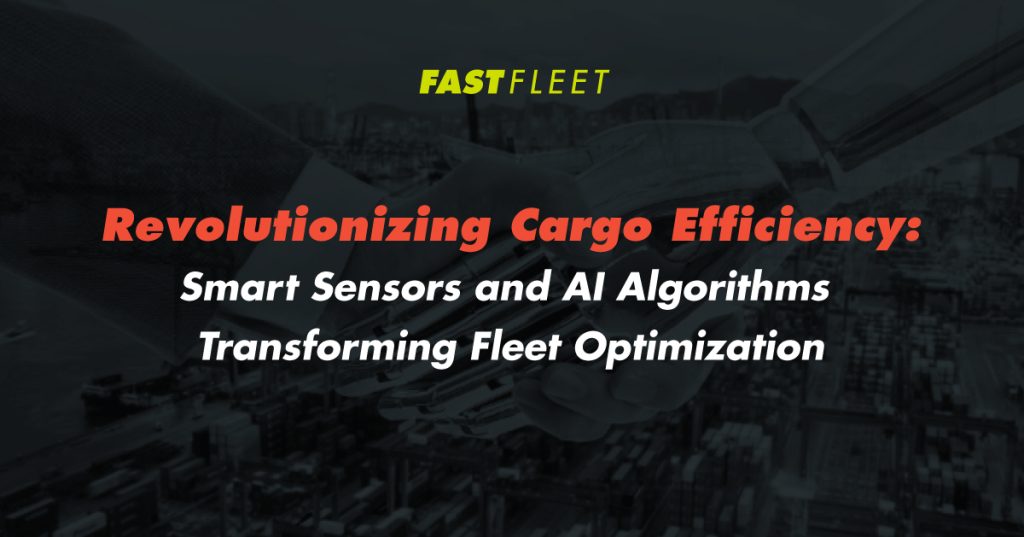Revolutionizing Cargo Efficiency: Smart Sensors and AI Algorithms Transforming Fleet Optimization
Why Cargo Load Optimization Matters in Trucking
In the world of trucking and logistics, efficiency is the name of the game. Every mile, every gallon of fuel, and every minute counts.
That’s why cargo load optimization is a topic that should be on the radar of every fleet manager. It’s not just about packing a truck to the brim; it’s about doing so in a way that maximizes profitability and minimizes waste.
In this blog post, we’ll delve into the common struggles fleet managers face when it comes to cargo load efficiency, how these challenges can affect them financially and operationally, and explore both traditional and innovative solutions to these problems.
Common Struggles Regarding Cargo Efficiencies
Cargo efficiency isn’t always as straightforward as it seems. There are several common challenges that fleet managers encounter:
- Unbalanced Loads: Ensuring that the weight is evenly distributed across the truck can be a puzzle. Too much weight on one side can affect stability and safety.
- Imagine a scenario where a fleet manager is overseeing a load of heavy machinery. If these machines are all placed on one side of the truck, it could lead to an unbalanced load, making the vehicle prone to tipping over on sharp turns or uneven terrain.
- Underutilized Space: Wasted space in a truck translates to wasted opportunities and profits. Maximizing the use of every inch of cargo space is a constant struggle.
Consider a refrigerated truck transporting perishable goods. If the cargo isn’t stacked efficiently, it might result in empty gaps between crates, wasting valuable space and reducing the number of products that can be delivered.- Time-Consuming Manual Calculations: In the past, fleet managers had to rely on manual calculations to optimize cargo loads. It’s a time-consuming process that often results in suboptimal load distribution.
Fleet managers often had to use spreadsheets and calculators to balance loads manually. This process is prone to human error and can be slow, especially when dealing with complex cargo configurations.
How These Struggles Affect Fleet Managers
Cargo load optimization challenges impact fleet managers on multiple fronts:
Financial Implications
Inefficient cargo loads can quickly eat into a fleet’s budget. The financial implications are significant:
Increased Fuel Costs: Poorly balanced loads lead to increased fuel consumption, directly impacting the bottom line.
If a truck’s cargo is unevenly distributed, it can cause excessive tire wear and increased fuel consumption due to uneven weight distribution. Over time, these costs can add up significantly.
Reduced Profit Margins: Unused cargo space means fewer goods transported per trip, ultimately reducing profitability.
Inefficient loading might require a fleet to make more frequent trips to transport the same amount of goods, resulting in higher operational costs and reduced profit margins.
Higher Maintenance Costs: The wear and tear on trucks from unbalanced loads can lead to more frequent maintenance and repair expenses.
A truck consistently carrying imbalanced loads might experience increased wear on its suspension system, leading to more frequent and costly repairs or replacements.
Manpower and Operational Challenges
In addition to the financial hit, cargo inefficiencies pose operational headaches:
- Driver Frustration: When cargo isn’t loaded optimally, drivers must contend with unbalanced and sometimes unsafe conditions on the road.
A truck driver dealing with a poorly balanced load may struggle with vehicle stability, making it harder to navigate winding roads or sudden stops.
- Compliance Concerns: Cargo that isn’t correctly loaded can lead to compliance issues, which can result in fines and additional administrative burdens.
In certain industries, such as hazardous materials transport, specific regulations dictate how cargo should be loaded to ensure safety and compliance. Failing to adhere to these regulations can lead to hefty fines and legal complications.
Optimize your Cargo Load With Modern Technology
Smart Load Sensors
One of the most exciting advancements in cargo load optimization is the advent of smart load sensors. These devices are designed to monitor weight distribution in real-time, revolutionizing the way fleet managers approach cargo efficiency.
Imagine a scenario where a fleet manager is responsible for transporting fragile electronic equipment. They’ve integrated smart load sensors into their trucks.
As the cargo is loaded, these sensors continuously collect data on weight distribution. If at any point during the journey, the weight becomes unbalanced, an alert is sent to both the driver and the fleet manager.
This real-time information allows for immediate adjustments, ensuring that the cargo remains evenly distributed and the truck remains safe on the road.
Smart load sensors offer several benefits:
- Real-Time Monitoring: These sensors provide instant feedback on cargo weight and balance, allowing for quick adjustments as needed.
- Improved Safety: By preventing unbalanced loads, smart sensors enhance on-road safety. The risk of accidents due to poor weight distribution is significantly reduced.
- Reduced Wear and Tear: Even weight distribution extends the lifespan of the truck’s components, reducing maintenance costs.
Artificial Intelligence (AI) Algorithms
Artificial Intelligence is making its mark in almost every industry, and cargo load optimization is no exception.
Advanced AI algorithms are becoming a game-changer for fleet managers, as they can analyze a myriad of variables to determine the most efficient way to load a truck.
Picture a fleet manager responsible for delivering various goods. Instead of relying solely on manual calculations or traditional methods, they employ an AI-powered optimization platform.
This platform takes into account factors such as the weight of each item, the size and shape of the cargo, and even delivery schedules.
Using this information, the AI algorithm generates the ideal loading plan, ensuring that the cargo is packed efficiently, maximizing both space and weight capacity.
AI-driven cargo load optimization offers remarkable advantages:
- Precision Planning: AI algorithms consider a multitude of variables simultaneously, creating loading plans that maximize both space and weight capacity with unparalleled precision.
- Time Efficiency: What might take a human planner hours to calculate, an AI algorithm can do in seconds, saving valuable time in the loading process.
- Cost Savings: Efficient cargo loading directly translates to reduced fuel consumption and wear on the vehicle, resulting in substantial cost savings over time.
These unique solutions, smart load sensors, and AI algorithms represent a significant shift in how fleet managers can tackle cargo load optimization challenges.
They offer real-time monitoring, precision planning, and the potential for substantial cost savings, making them powerful tools for today’s fleet management professionals.
Cargo load optimization is more than a puzzle to solve; it’s a crucial aspect of running a profitable and efficient fleet.
The financial and operational benefits of efficient cargo loading are undeniable. Fleet managers need to stay ahead of the curve, exploring both traditional and innovative solutions to these age-old challenges.
By doing so, they can maximize profits, minimize waste, and ensure their trucks are operating at peak efficiency.
















